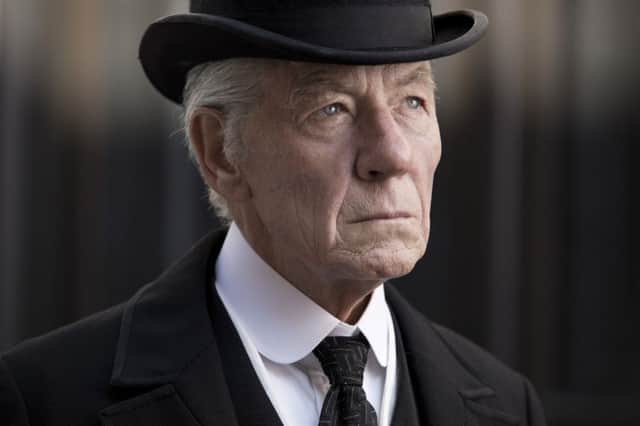Film review: Mr Holmes


Mr Holmes (12A)
Directed by: Bill Condon
Starring: Ian McKellan, Laura Linney, Milo Parker, Nicholas Rowe
* * *
That’s defiantly not the case with Mr Holmes. Adapted from Mitch Cullin’s 2005 novel A Slight Trick of the Mind (and slight would be an apt description of the ensuing film), this version stars Sir Ian McKellen as Sherlock and proceeds to age him beyond even McKellen’s advanced years. Well into his 80s and living in retirement in coastal Sussex when we first meet him, this Holmes is edging into infirmity and senility, the decrepitude of his body and mind imprisoning him in a seemingly permanent state of regret and self-enforced loneliness.
Advertisement
Hide AdWith only his ill-educated housekeeper Mrs Munro (Laura Linney), and her precocious young son Roger (Milo Parker) for company, he’s attempting to stave off dementia with the aid of royal jelly from his beehives and a medicinal Japanese root called prickly ash. The latter has been procured on a relatively recent trip to Tokyo at the invitation of an admirer by the name of Umezaki (Hiroyuki Sanada), a big fan of his work who has been in thrall to Holmes ever since his father first introduced him to his cases via the best-selling stories Holmes’s long-since departed compatriot Dr Watson wrote.
These books seem to be a point of contention for Holmes, who disputes their veracity and truthfulness, particularly when it comes to their final case together: an investigation into the mystery surrounding a missing woman by the name of Ann Kelmot, played by Hattie Morahan. As recounted in book form by Watson, the case was solved in typically neat and brilliant fashion, but Holmes isn’t so sure this was the reality. Twenty years on, he’s haunted by now-forgotten details: aware that the conclusion of the case was the reason for his retirement, but no longer sure why his self-enforced exile from life in London (and from the celebrity and notoriety he grudgingly enjoyed) was so absolute.
When his doctor (Roger Allam) suggests maintaining a diary to keep track of the jumbled thoughts that swarm around his dementia-riddled mind like the bees from his hives, he uses this as an excuse to re-examine that case himself – with the aid and encouragement of his housekeeper’s fatherless son.
The role of memory is a potent theme for fiction, particularly its deleterious impact on our lives as our capacity for recall diminishes with age. As such, there’s something intriguing about exploring this using a literary character famed for his feats of mental jujitsu. And yet the inherent danger of this approach would be akin to making a Superman film with the Man of Steel permanently incapacitated by Kryptonite: after a while it could become a bit of a drag.
Mr Holmes director Bill Condon attempts to get round this initially by using the writing of his memoir as a structural device to jump back-and-forth in time. As he did in his earlier film with McKellan, the Oscar-winning Gods and Monsters (about Frankenstein director James Whale), he has some fun blurring the boundaries between fiction and “reality”. As a slightly younger and sprightlier man, we see Holmes skulking through crowds of tourists keen for a glimpse of his famous Baker Street abode. And we see him too sneaking into cinemas to watch the latest adaptation of one of Watson’s books (in a playful touch, the film version of the case he’s reinvestigating has Holmes played by Nicholas Rowe, who played the character as a teenager in the Steven Spielberg-produced Young Sherlock Holmes). As has become de rigueur, there are also the myth-correcting denunciations of the iconography of old (the absence of the deer-stalker in particular).
These all offer minor pleasures, as does McKellen, who imbues Holmes with some of Gandalf’s cantankerous twinkliness, particularly in his scenes with young Parker and Linney, the latter injecting warmth into the rather thankless role of a dowdy war widow with little time for the past adventures of her employer that so captivate her son. Alas, there is just something a little underpowered about the case itself and the decision to spend so much time with the elderly Holmes serves only to further diminish interest in its resolution. How much more fun it would have been to see more of McKellen in Holmes’s more active state, particularly since any poignancy in his portrayal of encroaching senility is undercut by the sort of melodrama that can sometimes work in gentle Sunday night TV, which is where this film might find its true audience.